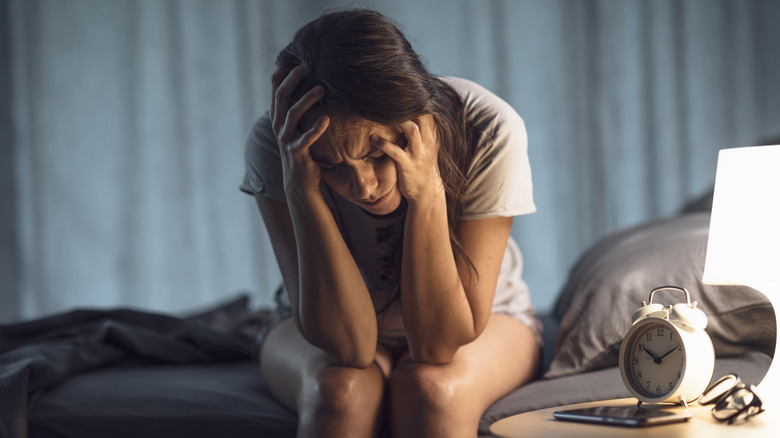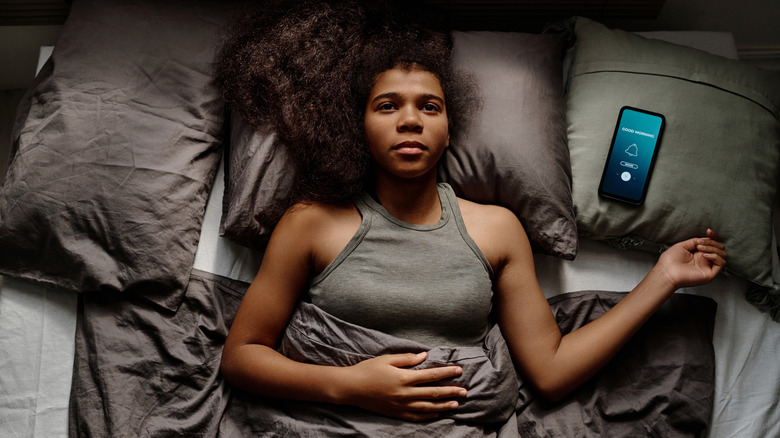The Possible Long-Term Risk If You Have Untreated Sleep Anxiety
A good night's sleep improves your health in more ways than you might realize. Besides keeping you from nodding off at your desk, getting enough sleep helps you stay focused at work so you can be more productive. Your immune system also gets to work while you rest, helping protect you from getting sick. Prioritizing sleep can lead to lower stress levels and a better mood, too. And long-term? Sleep helps protect you from chronic conditions like type 2 diabetes, heart disease, and high blood pressure. Getting those 7 hours can even help you maintain a healthy weight.
But knowing how important sleep is can sometimes make it even harder to fall asleep. Sleep anxiety is the fear that you either won't be able to fall asleep or that something might happen while you're asleep, says Dr. Raj Dasgupta, Chief Medical Advisor for Sleepopolis. "That stress builds up night after night and actually makes it harder to fall asleep, so it becomes a frustrating cycle," he says.
As a result, you could end up chronically sleep-deprived. "If it goes untreated, sleep anxiety can lead to problems with sleep quantity and quality, which is linked to higher blood sugar, insulin resistance, and increased cortisol levels, which over time may raise your risk for type 2 diabetes," Dasgupta said.
Sleep anxiety is different from general anxiety
It's one thing to feel anxious about life before bed. Generalized anxiety disorder can affect you throughout the day, causing you to worry or overthink events or uncertainties in your life. It can also lead to insomnia as a symptom. But sleep anxiety is more about stressing over whether you'll get enough sleep and feeling like you're failing at it. Your thoughts before bed might focus on how long it will take to fall asleep or how many times you'll toss and turn during the night.
GoodRx compares sleep anxiety to performance anxiety, except the "performance" is sleep. You might also notice physical symptoms like restlessness, muscle tension, or shallow breathing. These symptoms can feed into insomnia, making it even harder to fall asleep.
That doesn't mean sleep anxiety always happens on its own. It can also be a symptom of other mental health conditions like generalized anxiety disorder. You might also develop sleep anxiety if you've been diagnosed with post-traumatic stress disorder (PTSD), schizophrenia, or a panic disorder. It can show up alongside sleep disorders like restless legs syndrome, sleep apnea, or even sleepwalking. Drinking too much alcohol can also raise your risk of developing sleep anxiety.
How sleep anxiety is treated
If you think you might have sleep anxiety, your doctor can look at your sleep habits, lifestyle, and psychological history to get a clearer picture of what's behind your symptoms. Since underlying psychological issues can contribute to sleep anxiety, your doctor may refer you to a mental health professional for a more accurate diagnosis. If a sleep disorder is suspected, you might need to take part in a sleep study to monitor your breathing, heart rate, and brain activity while you sleep.
"Treatment usually starts with cognitive behavioral therapy for insomnia (CBT-I), which helps break the cycle of anxious thoughts around sleep," Dasgupta said. "I also talk to patients about stress-reducing habits and good sleep hygiene, and sometimes medication plays a short-term role too, depending on the situation."
Sleep hygiene means setting up a routine and environment that promote rest and relaxation. That often includes keeping a consistent sleep schedule, building in a calming bedtime ritual, and making sure your bed and bedroom are cool, comfortable, and inviting for sleep.


